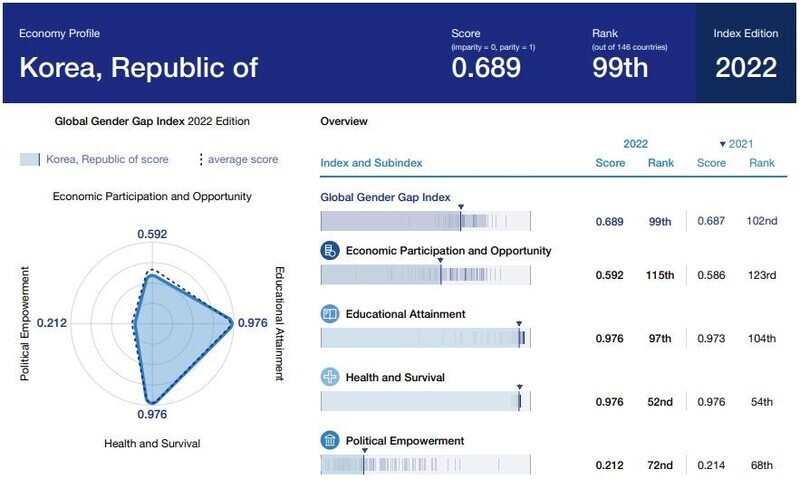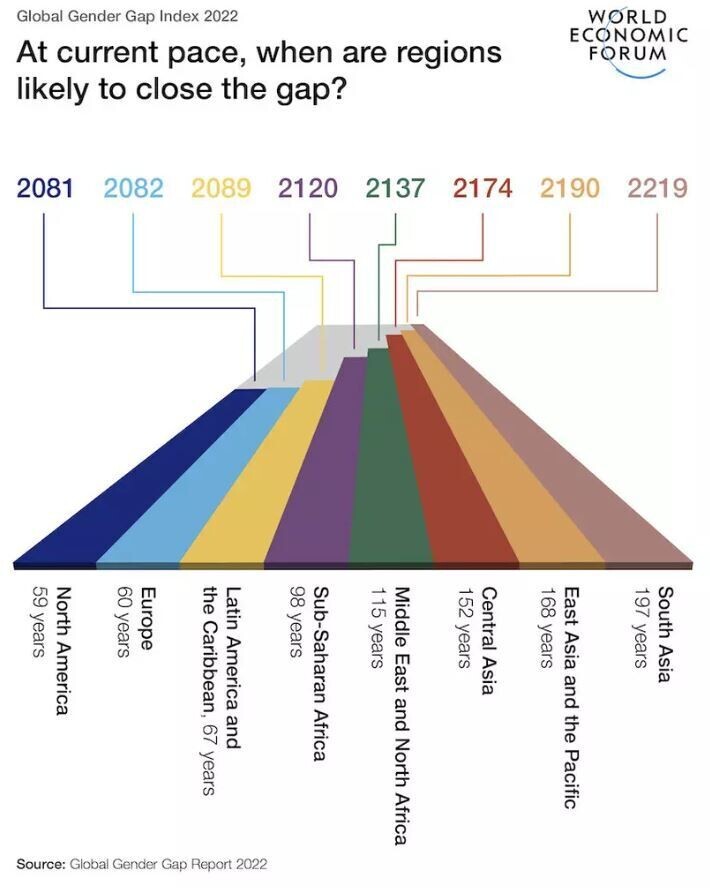hankyoreh
Links to other country sites 다른 나라 사이트 링크
Korea once again ranks near bottom of list for gender parity, report shows

South Korea placed 99th out of 146 countries examined in the Global Gender Gap Index rankings reported by the World Economic Forum (WEF).
On Wednesday, the WEF published its “Global Gender Gap Report 2022,” which reflects gender disparities in the areas of politics, economy, education, and health in 146 countries around the world.
Calculated every year, the index reflects gender disparities in economic participation and opportunity, educational attainment, health and survival, and political empowerment. Rather than reflecting the economic and political level of each country, it only focuses on the gender gaps within it.
A country’s final score is seen as showing greater disparities the closer it is to zero and greater equality the closer it is to one.
South Korea’s score was 0.689, putting it in 99th place, or 0.002 points and three spots higher than last year. With last year’s survey focusing on 156 countries — 10 more than this year — the scores cannot be seen as showing any major improvement in the gender gap.

The most severe gender disparities were found in the area of economic participation and opportunity. In that category, South Korea ranked 112th with a score of 0.592, which reflected five subindicators including labor force participation, wage equality, and representation in senior and management positions.
In particular, it ranked in the bottom tier among countries examined for inequality in senior official and management positions (125th) and estimated earned income (120th).
In the area of educational attainment, South Korea ranked 97th. No real gender gap was observed in the literacy rate, but the tertiary education enrollment rate was 19.71 percentage points lower for women than for men, ranking South Korea 113th in the world.
In the category of political empowerment, South Korea’s ranking was 72nd. Political disparities in representation among National Assembly members were particularly pronounced: The rate of female membership was 62.8 percentage points lower than male membership, ranking South Korea 104th overall.
While South Korea’s ranking improved in other areas, its political empowerment ranking this year was four spots lower than last year, when it placed 68th. It ranked 52nd in the category of health and survival.
The country with the smallest gender gap was Iceland, which ranked first for the 13th straight year. The top spots were dominated by Scandinavian countries, including Finland and Norway.

By continent, South Korea ranked 12th in the Asia-Pacific region, ahead of both Japan (116th) and China (102nd).
Globally, the equivalent achievement rate was 68.1%, where 100% represents complete equality between women and men.
“At the current rate of progress, it will take 132 years to reach full parity,” the WEF concluded.
For the Asia-Pacific region, which includes South Korea, it was predicted that achieving full parity would take 168 years.
By Choi Yoon-ah, staff reporter
Please direct questions or comments to [english@hani.co.kr]

Editorial・opinion
![[Column] Park Geun-hye déjà vu in Yoon Suk-yeol [Column] Park Geun-hye déjà vu in Yoon Suk-yeol](https://flexible.img.hani.co.kr/flexible/normal/500/300/imgdb/original/2024/0424/651713945113788.jpg) [Column] Park Geun-hye déjà vu in Yoon Suk-yeol
[Column] Park Geun-hye déjà vu in Yoon Suk-yeol![[Editorial] New weight of N. Korea’s nuclear threats makes dialogue all the more urgent [Editorial] New weight of N. Korea’s nuclear threats makes dialogue all the more urgent](https://flexible.img.hani.co.kr/flexible/normal/500/300/imgdb/original/2024/0424/7317139454662664.jpg) [Editorial] New weight of N. Korea’s nuclear threats makes dialogue all the more urgent
[Editorial] New weight of N. Korea’s nuclear threats makes dialogue all the more urgent- [Guest essay] The real reason Korea’s new right wants to dub Rhee a founding father
- [Column] ‘Choson’: Is it time we start referring to N. Korea in its own terms?
- [Editorial] Japan’s rewriting of history with Korea has gone too far
- [Column] The president’s questionable capacity for dialogue
- [Column] Are chaebol firms just pizza pies for families to divvy up as they please?
- [Column] Has Korea, too, crossed the Rubicon on China?
- [Correspondent’s column] In Japan’s alliance with US, echoes of its past alliances with UK
- [Editorial] Does Yoon think the Korean public is wrong?
Most viewed articles
- 1[Guest essay] The real reason Korea’s new right wants to dub Rhee a founding father
- 2Why Korea shouldn’t welcome Japan’s newly beefed up defense cooperation with US
- 3[Column] ‘Choson’: Is it time we start referring to N. Korea in its own terms?
- 4New AI-based translation tools make their way into everyday life in Korea
- 5[Column] Park Geun-hye déjà vu in Yoon Suk-yeol
- 6Senior doctors cut hours, prepare to resign as government refuses to scrap medical reform plan
- 7Opposition calls Yoon’s chief of staff appointment a ‘slap in the face’
- 8Will NewJeans end up collateral damage in internal feud at K-pop juggernaut Hybe?
- 9Terry Anderson, AP reporter who informed world of massacre in Gwangju, dies at 76
- 10Thursday to mark start of resignations by senior doctors amid standoff with government